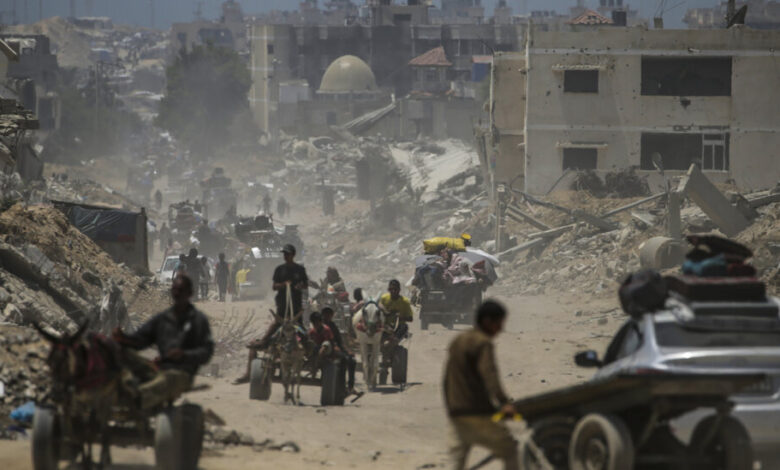Israel attacks southern Gaza after evacuation order: Live updates

Crowds of Palestinians fled an area in southeastern Gaza on Tuesday, after Israel issued an evacuation warning for most of the residents in the cities of Khan Younis and Rafah, and struck several targets in southern Gaza overnight.
The evacuation order on Monday and the night of heavy airstrikes came despite recent statements from Israeli commanders and Prime Minister Benjamin Netanyahu promising to gradually reduce ground operations and shift to a phase of targeted, lower-intensity strikes.
Israeli officials have said in recent days that they are nearing the end of a military offensive in the southern city of Rafah, which was billed as the last major ground exercise of the war. But they have also said that Israeli forces will continue operations in Gaza in the near future to quell pockets of resistance and prevent Hamas from regaining control.
For many Gazans who have fled multiple times, the situation on the ground may not have changed much. Israeli forces have repeatedly returned to conduct multi-day operations in neighborhoods they captured in the initial offensive to quell renewed unrest by Palestinian militants.
The trigger for the evacuation and Israeli strikes last night around Khan Younis appeared to be a barrage of around 20 rockets that the military said were fired from the area by Palestinian militants towards Israeli cities on Monday. The military said Israeli forces retaliated last night after “allowing civilians to evacuate the area”.
The United Nations estimates that about 250,000 people will have to flee a large swath of southern Gaza to comply with the Israeli military order. Scott Anderson, a senior U.N. official, said the calculation was based on pre-war population data and anecdotal observations of how many people have returned to the city.
Stéphane Dujarric, spokesman for the UN secretary-general, said evacuations on such a scale would only add to the suffering of people already facing food and water shortages. “People are faced with the impossible choice of moving, some perhaps for a second or even third time, to areas with little space or services, or staying in areas where they know there will be heavy fighting,” he said.
For Gazans, the recent offensive against the resurgent Hamas militant group has been anything but low-intensity. Hundreds of Palestinian militants have been killed in fighting in the northern Gaza neighborhoods of Shajaiye, Jabaliya and Zeitoun, according to the Israeli military. In Jabaliya, more than 60,000 people have been displaced, returning to find widespread devastation, according to the United Nations.
Israeli forces largely withdrew from Khan Younis in April after months of fighting as they prepared to invade Rafah further south. In the relative calm that followed, many of the town’s residents returned home, some living in tents next to the ruins of their homes.
Suzan Abu Daqqa, 59, returned to her home in the southern suburb of Khan Younis last month. It was relatively intact after the intense Israeli bombing that destroyed much of the city, and there was still clean water.
But on Monday evening, Abu Daqqa and her family heard that the Israeli army had again ordered the evacuation of the eastern suburbs of the city. She said the familiar sound of artillery fire began, forcing her to flee northwest with her relatives.
Thousands of people flooded the streets of the destroyed city on Monday night as they headed towards the Mawasi area near the coast, which Israel has designated as a “safer area”.
“How long can we continue to be ordered: Leave and come back, leave and come back?” said Abu Daqqa.
On Tuesday, residents of Khan Younis said most of the explosions they could hear seemed to come from further south, in Rafah, suggesting that, at least for now, the fighting in their city had become less intense. However, the widespread evacuation order could signal a new military operation there.
Amir Avivi, a retired Israeli brigadier general, said the Israeli military would seek to gradually eliminate the remaining Hamas fighters in the area, a process he said could take years. Over time, Israel hopes to erode Hamas’s power so thoroughly that Gaza will become increasingly under its control, he said.
“Every time a terrorist group establishes itself, there is a raid to deal with it,” said General Avivi, head of the hawkish Israel Defense and Security Forum. “These raids can last a few days or a week — usually no more than a few days — and then you withdraw.”
General Avivi said that for many Gazans, the operation looked very similar to Israel’s current military campaign in the north.
“There won’t be any difference in feeling, except for the force mobilized and the number of soldiers,” he said.




